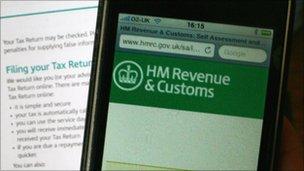Taxman steps up scrutiny of online traders
- Published

More campaigns against tax dodgers are in the offing
The tax authorities are going to use improved surveillance software to track down people trading on marketplace websites but failing to pay tax.
HMRC said one of its new campaigns would try to identify regular sellers on eBay, Auto Trader, E-auctions, Amazon, Craigslist and Gumtree.
Occasional sellers of personal items do not need to pay tax.
But people earning a living as self-employed traders may need to pay income tax, national insurance and VAT.
HM Revenue & Customs said the data it gleaned would be compared with its existing computerised records for income tax paid under self-assessment or PAYE, tax credits and national insurance.
"It shines a light onto previously hidden relationships, uncovering anomalies between such elements as bank interest, property income and lifestyle indicators before homing in on unexplained inconsistencies," an HMRC spokesman said.
The Revenue is also planning to launch more disclosure campaigns in this current tax year, aimed at specific groups of individuals, such as private tutors and fitness coaches, and tradesmen.
In the past couple of years the authorities have been making special efforts to get doctors and dentists, plumbers, and more recently restaurateurs, to come clean and pay the right tax.
Gary Ashford, of the Chartered Institute of Taxation (CIOT), said:
"The news last week that HMRC have launched 16 criminal investigations off the back of earlier campaigns shows that the taxman is taking a very tough line against suspected tax evaders."
"It will be important for HMRC to explain to e-traders the borderline between an individual selling one's own surplus belongings and moving into trading," he added.
HMRC first used computer software four years ago to track down tax-dodging internet traders on eBay.
Tens of thousands of people are thought to make part or all of their living by selling goods on online market places.
"If you look at these websites it is obvious that people have got a stock of goods they are selling, and hiding the proceeds in undeclared offshore bank accounts," said Ronnie Ludwig of accountants Saffery Champness.
"They are dodging taxes if they have a regular supply of goods they are selling."